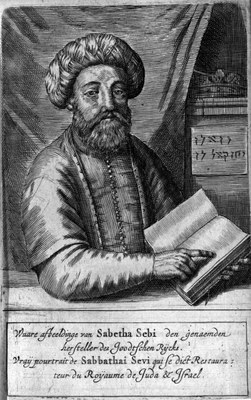Shabtai Zvi (1626–1676)
In the mid-seventeenth century many Jews in the Middle East and Europe considered the young Turkish Jew Shabtai Zvi (1626–1676) to be the mystic Messiah and son of David. Processions were even held in his honour. The cabbalistic calculations of the scholar Nathan of Gaza (1643–1680), who formulated the tenets of "Sabbatianism", and the rapid spread of Nathan’s and Shabtai Zvi’s writings in the form of pamphlets and proclamations made the supposed Messiah Shabtai Zvi and his prophet Nathan of Gaza known throughout nearly the entire Jewish diaspora within a short period of time (1665–1666).
Shabtai Zvi (1626–1676), copper engraving, before 1669, unknown artist; source: Coenen, Thomas: Ydele Verwachtinge der Joden, getoont in den Persoon van Sabethai Zevi, haeren laetsten vermeynden Messias: ofte Historisch Verhael van't gene ten tyde syner opwerpinge in 't Ottomanisch Rick onder de Joden aldaer voorgevallen is, en syn Val, Amsterdam 1669. Digital Copy: Niedersächsische Staats- und Universitätsbibliothek Göttingen, Inv. No.: 8 H E ECCL 932/1, http://resolver.sub.uni-goettingen.de/purl?PPN657558044.
